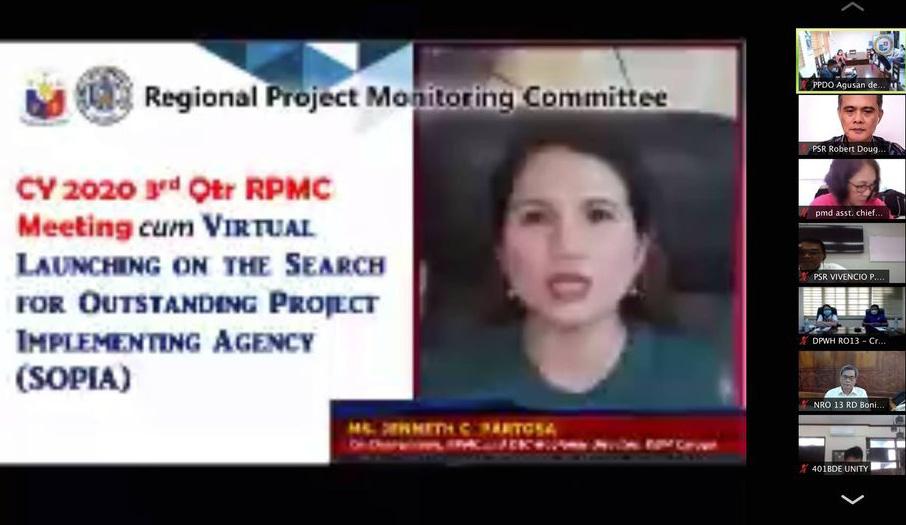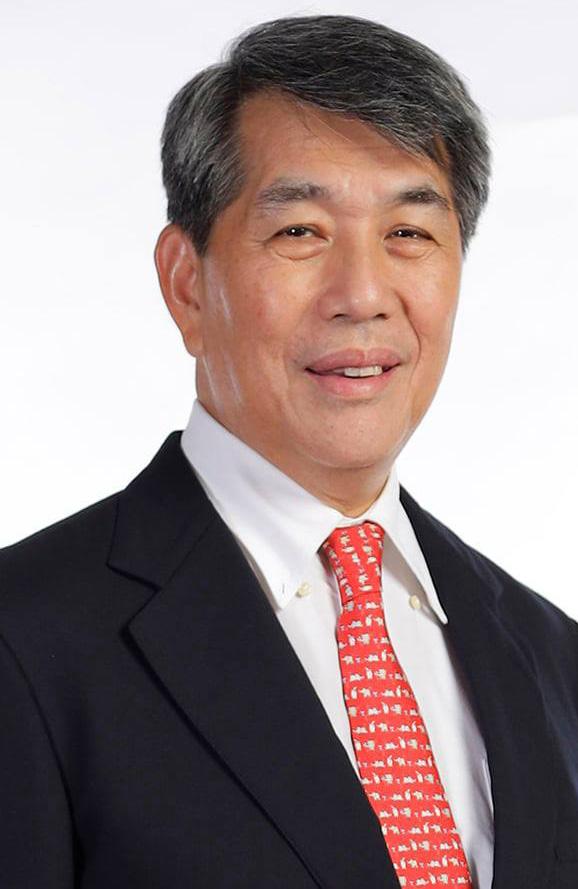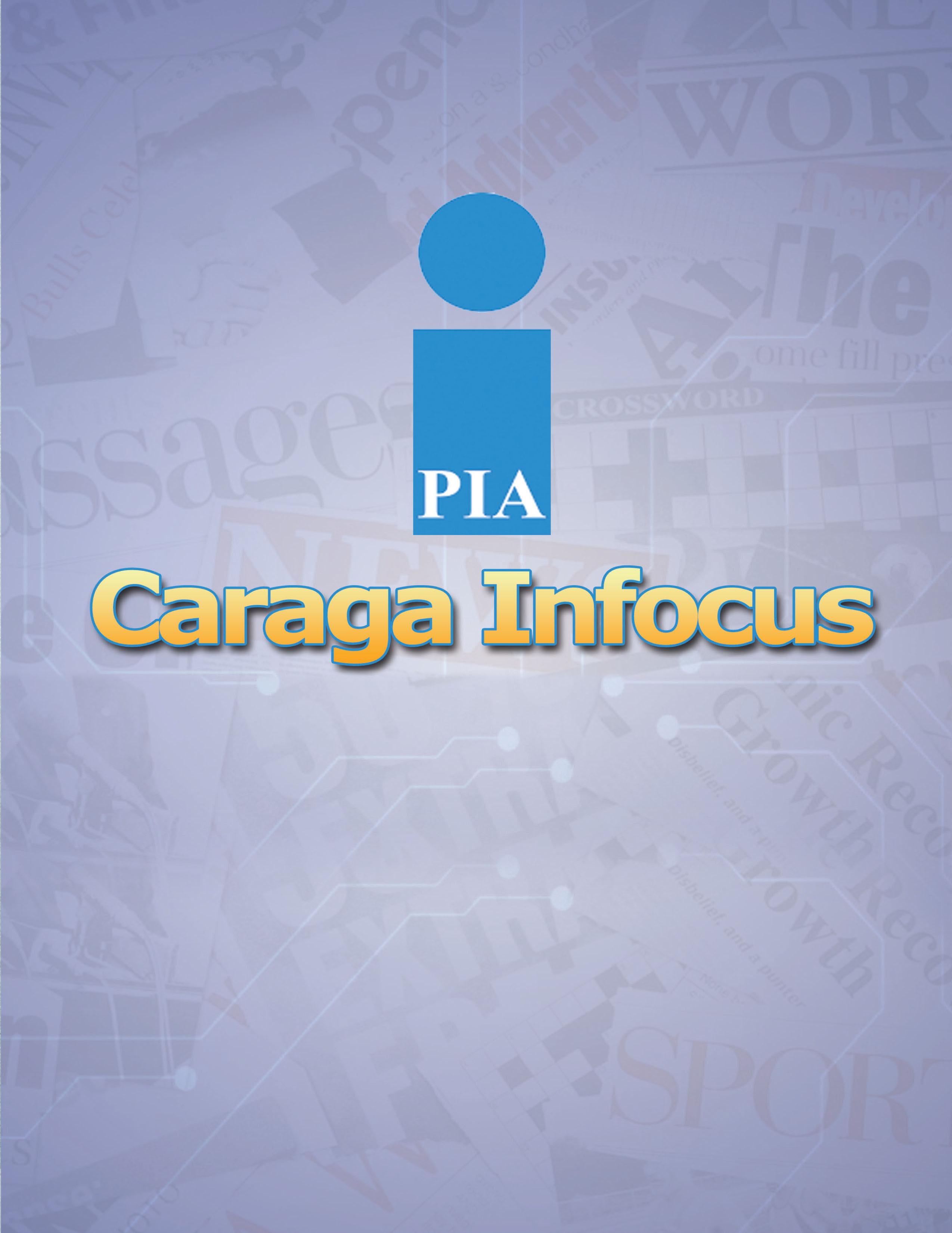
5 minute read
Caraga RPMC launches award for project implementing agencies
By Ian G. Miculob
The Caraga Regional Project Monitoring Committee (RPMC) virtually launched the first Search for Outstanding Project Implementing Agency (SOPIA) in the region on 17 September 2020, participated by national government agencies, local government units, academe, and the private sector.
Advertisement

“We have noted that very few recognitions, if ever there were some, were awarded or conferred to regional line agencies for efficiently and effectively implementing programs and projects,” Atty. Bonifacio G. Uy, RPMC chairperson and regional director of the National Economic and Development Authority (NEDA) Caraga, said as he opened the virtual launching activity.
Emphasizing the importance of monitoring and evaluation, Engr. Epimaco M. Galero Jr., co-chairperson of the Caraga Regional Development Committee (RDC) and private sector representative for the Logistics Sector, pointed out that there is a need to ensure that the interventions fulfill the expected results, and that there is a strong case to increase the use of evidence-based information in decision-making especially in these challenging times.
“One of the government’s recovery plan is to accelerate countryside development, connectivity, and job generation through infrastructure program,” explained OIC-Regional Director Jenneth C. Partosa of the Department of Budget and Management and co-chairperson of the Caraga RPMC.
She added that the SOPIA is a way of ensuring that interventions in the region are completed effectively and efficiently in order to support recovery and our goal of becoming the Fishery, Agro-forestry, Mineral and Eco-tourism (F.A.M.E.) Center of the Philippines.
The launching of SOPIA also signals the start of submission of entries until 30 September 2020, with the following eligibility requirements: a) The project must be implemented in the region with a duration of not less than six months; b) Multi-year or one-year implemented project may be included as long as it commenced and was completed within the implementation period from CY 2018 to CY 2020; c) Project cost is more than or equal to P5 million; d) The implementing agency must be a regional office in the Caraga Region regardless of fund source (regional or downloaded from central office); e) The project must have complete and timely project reports, such as monthly/ quarterly physical and financial reports in the Regional Project Monitoring and Evaluation System format; and f) Must adhere to the Harmonized Gender and Development Guidelines on Project Development, Implementation, Monitoring, and Evaluation (PDIME) of the NEDA, Philippine Commission on Women and ODA-GAD Network.

The winners will be recognized during the 4th Quarter Caraga Development Council Meeting and will receive the following: P50,000 and a plaque for the 1st prize; P25,000 and a plaque for the 2nd prize; and P10,000 and a plaque for the 3rd Prize. Special citations will also be awarded to shortlisted nominees.
Following the SOPIA Virtual Launching, the RPMC discussed the issues on the FishCORAL implementation in the region, the Umayam River Irrigation Project, and the ProblemSolving Session on the Diosdado Macapagal Bridge, and the regular reports of the Local Project Monitoring Committees during its 3rd Quarter 2020 Teleconference Meeting. (NEDA Caraga/PIA-Caraga)
DBP loan portfolio up 15.6%, reaches P364.4B in 1st half
State-owned Development Bank of the Philippines (DBP) continued to boost its financial support for strategic growth initiatives in the second quarter of the year, with P364.4-billion in loans to borrowers reflecting a notable 15.6% increase from the P315.13- billion recorded during the same period last year, a top official said.

DBP President and Chief Executive Officer Emmanuel G. Herbosa said the provision of sustained development financing to business and industry remains crucial as the country gradually recovers from the effects of the current global health crisis.
“As the premier infrastructure bank of the country, DBP will continue to streamline its lending programs to be more responsive to the funding needs of priority economic sectors, in support of the government’s recovery initiatives given the adverse impact of the pandemic,” Herbosa added. Herbosa said that bulk of the loans amounting to P165.3-billion went to
DBP President and Chief Executive Officer Emmanuel G. Herbosa.

the infrastructure and logistics sector, followed by loans to social services, P77.1-billion, environment projects, P43.6-billion, and micro, small, and medium enterprises, P29.6-billion.
He attributed the increase in its loan portfolio to aggressive lending activities by its 30 lending units nationwide despite the challenges posed by the pandemic during the second quarter of the year.
“Our Rehabilitation Support Program on Severe Events (DBP RESPONSE) has helped our clients mitigate the impact of the prevailing health emergency with four borrowers benefiting from the P429-million loan approval from January to June this year,” Herbosa said. Herbosa also reported that the bank’s total deposits grew by more than 37% as of end June this year, to P637.11-billion from the P463.83-billion reported in the same period in 2019 as a result of the marketing and financial inclusion initiatives undertaken by DBP’s expanded branch network of 129 branches and 11 branch-lite units nationwide.
He said this deposit growth typifies the growing public sentiment that DBP is a strong and stable financial institution, manned by dedicated public servants who continued to provide service despite the prevailing health climate.
“During the second quarter of the year, DBP’s total assets also grew by more than 25%, to P835.81-billion from P667.91-billion during the same period last year, bringing us closer to our goal of becoming a one trillion-peso bank by 2022,” Herbosa said. Corporate Services and concurrent DBP Head of Operations Marietta M. Fondevilla said the bank’s net income for the first semester reached P2.9- billion, down by 6.45% from the P3.1- billion from the same period last year, due mainly to higher provisioning for credit losses.


She said gross revenue totaled P16.53-billion, showing a 4% increase from the P15.91-billion that DBP generated in 2019. “Notwithstanding the various congressional initiatives to strengthen DBP’s financial position, the bank will continue to maximize and re-allocate its resources to fund initiatives with optimal development impact, while ensuring DBP’s viability during these challenging times,” Fondevilla said. (DBP/PIA Caraga)





